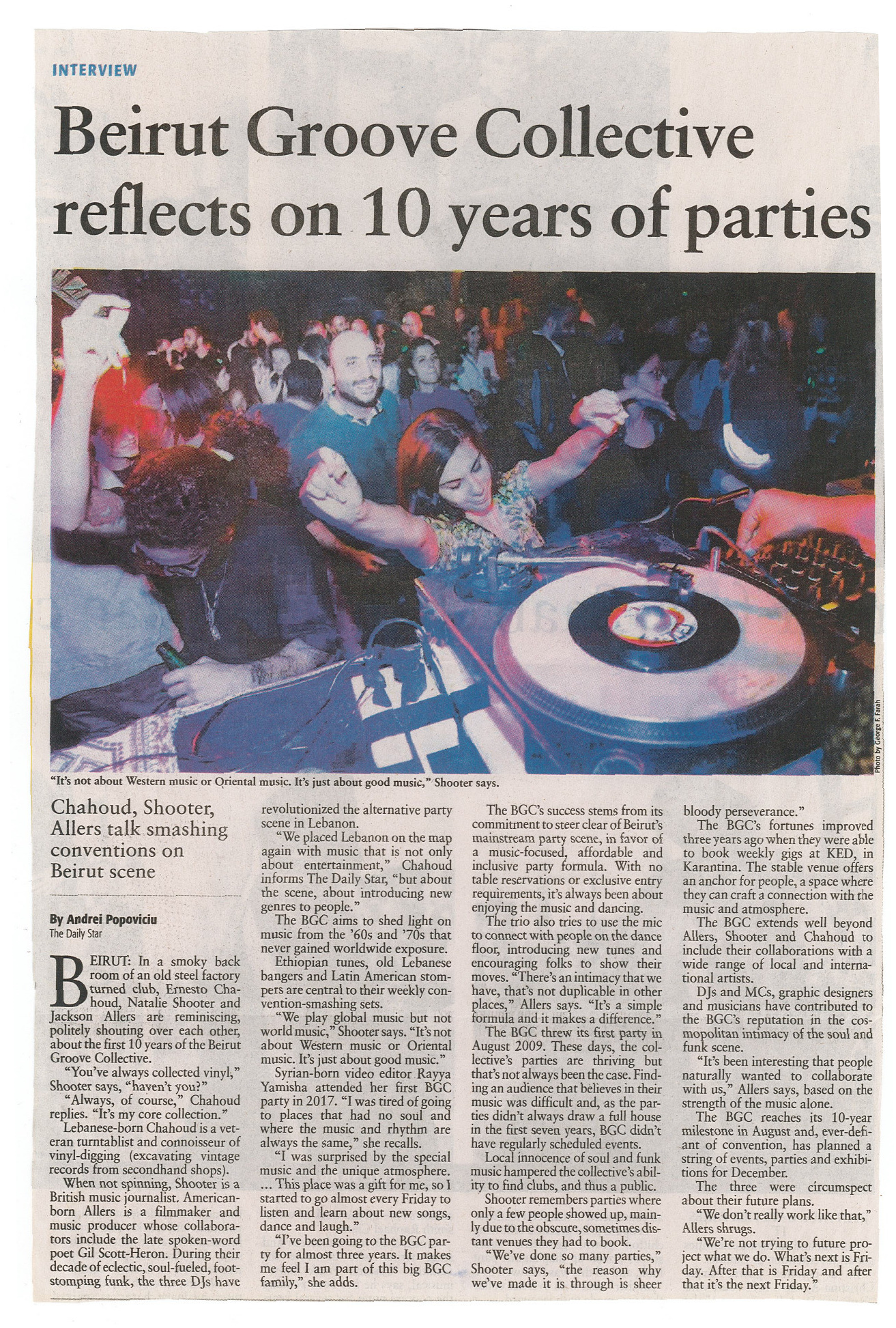Beirut Groove Collective reflects on 10 years of parties
A version of this article appeared in the web edition of The Daily Star on July 05, 2019.

BEIRUT: In a smoky back room of an old steel factory turned club, Ernesto Chahoud, Natalie Shooter and Jackson Allers are reminiscing, politely shouting over each other, about the first 10 years of the Beirut Groove Collective. “You’ve always collected vinyl,” Shooter says, “haven’t you?”
“Always, of course,” Chahoud replies. “It’s my core collection.”
Lebanese-born Chahoud is a veteran turntablist and connoisseur of vinyl-digging (excavating vintage records from secondhand shops).
When not spinning, Shooter is a British music journalist. American-born Allers is a filmmaker and music producer whose collaborators include the late spoken-word poet Gil Scott-Heron. During their decade of eclectic, soul-fueled, foot-stomping funk, the three DJs have revolutionized the alternative party scene in Lebanon.
“We placed Lebanon on the map again with music that is not only about entertainment,” Chahoud informs The Daily Star, “but about the scene, about introducing new genres to people.”
The BGC aims to shed light on music from the ’60s and ’70s that never gained worldwide exposure.
Ethiopian tunes, old Lebanese bangers and Latin American stompers are central to their weekly convention-smashing sets.
“We play global music but not world music,” Shooter says. “It’s not about Western music or Oriental music. It’s just about good music.”
Syrian-born video editor Rayya Yamisha attended her first BGC party in 2017. “I was tired of going to places that had no soul and where the music and rhythm are always the same,” she recalls.
“I was surprised by the special music and the unique atmosphere. ... This place was a gift for me, so I started to go almost every Friday to listen and learn about new songs, dance and laugh.”
“I’ve been going to the BGC party for almost three years. It makes me feel I am part of this big BGC family,” she adds.
The BGC’s success stems from its commitment to steer clear of Beirut’s mainstream party scene, in favor of a music-focused, affordable and inclusive party formula. With no table reservations or exclusive entry requirements, it’s always been about enjoying the music and dancing.
The trio also tries to use the mic to connect with people on the dance floor, introducing new tunes and encouraging folks to show their moves. “There’s an intimacy that we have, that’s not duplicable in other places,” Allers says. “It’s a simple formula and it makes a difference.”
The BGC threw its first party in August 2009. These days, the collective’s parties are thriving but that’s not always been the case. Finding an audience that believes in their music was difficult and, as the parties didn’t always draw a full house in the first seven years, BGC didn’t have regularly scheduled events.
Local innocence of soul and funk music hampered the collective’s ability to find clubs, and thus a public.
Shooter remembers parties where only a few people showed up, mainly due to the obscure, sometimes distant venues they had to book.
“We’ve done so many parties,” Shooter says, “the reason why we’ve made it is through is sheer bloody perseverance.”
The BGC’s fortunes improved three years ago when they were able to book weekly gigs at KED, in Karantina. The stable venue offers an anchor for people, a space where they can craft a connection with the music and atmosphere.
The BGC extends well beyond Allers, Shooter and Chahoud to include their collaborations with a wide range of local and international artists.
DJs and MCs, graphic designers and musicians have contributed to the BGC’s reputation in the cosmopolitan intimacy of the soul and funk scene.
“It’s been interesting that people naturally wanted to collaborate with us,” Allers says, based on the strength of the music alone.
The BGC reaches its 10-year milestone in August and, ever-defiant of convention, has planned a string of events, parties and exhibitions for December.
The three were circumspect about their future plans.
“We don’t really work like that,” Allers shrugs.
“We’re not trying to future project what we do. What’s next is Friday. After that is Friday and after that it’s the next Friday.”
Post a comment